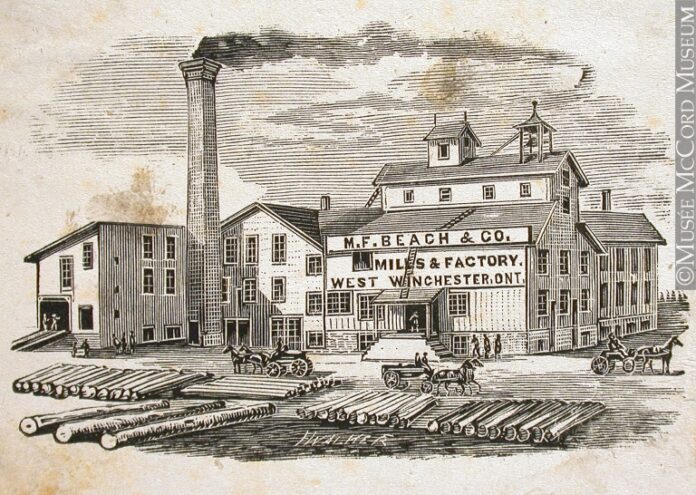by Susan Peters, Dundas County Archives
Dundas County was originally settled in 1784 by loyalist refugees of the American Revolution. As refugees, they brought with them only basic necessities for their new life in the wilderness. As they resettled into what became Dundas County, they had to start fresh.
It was not until 1847, with the completion of the St Lawrence Canal, that industry could build. Iroquois was the industrial centre of Matilda Township, as Morrisburg was for Williamsburg Township. The Williamsburg Canal enabled the harnessing of water power so that mills could be built in Morrisburg, along with the construction of the Grand Trunk Railway in 1854. It was not until 1884 that Mountain and Winchester townships were serviced by rail, courtesy the Canadian Pacific.
As industrialization was slow in Dundas County, so was the development of furniture making. For many years, rural settlers could only afford the absolute bare necessities for survival. The first furniture makers did not advertise in local newspapers until 1842.
The first known cabinet maker in Dundas County was William Marsh. His son continued with the business until at least 1900. They were listed in directories, census, and newspaper ads in Iroquois. By 1884, his son W. J. March was also listed in an advertisement as ‘furniture maker and undertaker.’
Between 1840 and 1900, there were 112 cabinet or furniture makers in Dundas County.
Several were long-term businesses, such as M. F. Beach. Nearly two-thirds were located in Iroquois. As Mountain Township did not have water access, it was slower to develop industries. Mountain was home to 13% of the furniture makers of the county. Two were in Inkerman, three in South Mountain, and two in Van Camp.
Elijah Gregory was in business in South Mountain from 1874 to 1900. Earnest Hunter served the same region from 1896 to 1900. Inkerman was the base for William Suffel from 1864 to 1871. George Hope served Van Camp from 1881 to 1895. His business included a general store as well as furniture and he was succeeded by his son Wesley in 1881.
Winchester Township was a challenge to research due to the fact that a large percentage of the furniture makers had a very short tenure. The other challenge was the constant name changes of the communities. Armstrong Mills became known as Winchester in 1845. In 1875, it was changed to Chesterville. Bates Corners was, at one point, known as West Winchester. By 1892, it was known as Winchester Village. The township produced 33 of the 112 cabinet makers in the County.
In West Winchester (later known as Winchester Village), John Ross operated as a furniture maker and undertaker from 1890 to 1896. The most noteworthy of cabinet makers in Dundas County was Mahlon Beach. He moved to Winchester in 1856 and set up a saw mill. Between 1861 and 1878, he also operated a general store, cheese factory, and a grist mill. In 1883, he ran a roller mill in Iroquois.
On July 12, 1884, the entire plant in Winchester was destroyed by fire. But he was undaunted and built a bigger factory. He was by far the largest player in the furniture business, employing over 100 people in 1900. His success could partially be attributed to a long-term contract with the Eaton’s Company during this time: selling ready-made furniture through their show rooms and catalogue.
Beach was also involved in local politics. He was Warden of SD&G Counties in 1873. He left a legacy with 10 children, many of whom continued in his business endeavours.
dundascountyarchives@gmail.com



